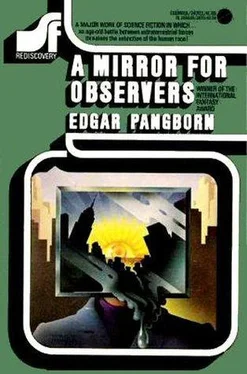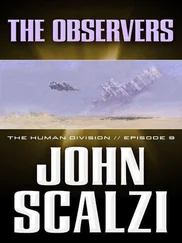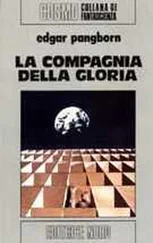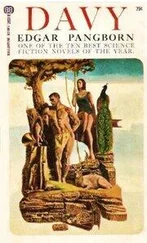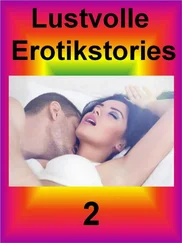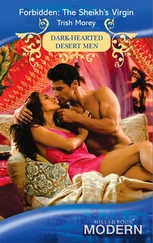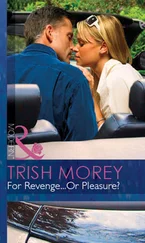“I have a special corner in the temple,” said Abraham, and put a cigarette between her lips and lit it for her and kissed her forehead. “The corner where you can hear best. Remind me to tell you sometime that you’re slightly snub-nosed.”
“Are you p-partial to pug noses?”
I went back to Sophia….
Abraham needed to talk to me, a little, as we started home. Fortunately the automobile is one human gimmick that doesn’t overawe me. I feel almost at home with it so long as it stays on the ground. Don’t think I’ll ever try the plane-car they’re experimenting with nowadays. The damn thing has wings folded over its back like a beetle’s; it’s supposed to snap them out at a comfortable seventy miles per hour and take off. Retractile propeller. Slow stuff, not intended to do anything over three hundred when it’s airborne, but all the same I think they can keep that one. Nice, of course, for kids anxious to find some new way of breaking their necks. Poking through those quiet and sober streets that had grown empty toward midnight, I was able to listen to Abraham without thinking much about my driving. He wanted to talk about the reform school. Not, I think, on his own account, but to satisfy possible questions that I had not spoken.
He had grown a shell in that environment, except for a few friendships. And those, he said, were all shadowed by the sense that nothing could ever last very long. I said something commonplace to suggest that human growth had much in common with the growth of insects: old chrysalids tossed on the rubhish heap and new ones grown. “Still,” he said, “as a larger bug I probably have a better memory of earlier states of bugginess than, say, a weevil.” He went on to make a rather horrible and intricate pun deriving pupil from pupa which, out of respect for our Martian community, I decline to record. He told me more about how the lost boys came and went. It had been a large school with, I guess, a fairly sensitive conscience somewhere at the top. The boys were of all sorts — the sickly, the morons, the majority called normal, the few bright ones; making a fenced-in, neurotic community, it seemed to Abraham that they had had little in common except bewilderment. Even bitterness was curiously absent in some of them. They were abused more by each other than by authority. Such violence as he saw was mostly furtive. Discipline was rigid enough, and the school had made a serious effort to weed out bullies or clip their claws. “I carried a knife,” Abraham told me. “Never could have used it, but it was the thing to do. Like a fraternity pin, I guess. A new boy would get beat up a few times, then someone would befriend him, see that he learned to carry a knife, talk the accepted language, and he’d be let alone. I was able to get some books. Last two years I had a sort of trusty job, in the so-called library. Except for the physical thrills, even beating up a new candidate was a sort of — oh, dutiful routine…. Well, they did have one thing in common besides bewilderment. The nobody-loves-me feeling. Those who had parents coming to see them had it worst. But we all felt or imagined or tried to imagine that no one had ever cared much about us. I knew better, Will, so did a lot of the others, but you couldn’t say so. Saying so would have been admitting that you might be partly to blame yourself, but it was more than that. You had to believe you were unwanted, or you’d be a social outcast. The school of paradox. Maybe not such a bad preparation for what’s outside. You know, Will — the old school tie. Alumnus Brown recalls the golden age.” But there was no overtone of bitterness. “Will, I wonder — can anything turn around and kick itself in the teeth like the human mind?”
“I dunno. Did you ever help beat up a new one?”
He said with remarkable gentleness: “You could almost guess the answer to that one.”
“Uh-huh — you never did.”
“Almost right. I never helped beat up anyone, but to offset that, I never had the guts to try to stop it either. Except once.”
“And that time?”
He rolled up his left sleeve and showed me his arm in the dashboard light. The scar was nearly white, running from elbow to wrist. “I’m proud of that hash mark,” he said. “It tells that on one occasion I did have a little guts, and it taught me something.” Still I heard nothing in his voice except a reflective serenity neither sad nor happy. “It taught me: unless you’re a gorilla, don’t interfere with the pleasures of chimps.” And somewhat later he said: “Punishment — that’s the idea that taints the whole system, reform schools, prisons, four fifths of the criminal law. Cure the curable, keep the incurable where they can’t hurt others — anything else is just humanity picking at a sore and half enjoying the pain.” He was talking to himself as much as to me. “From all I’ve read, Will, it seems that enlightened people with experience have been hammering that idea for at least a hundred years. Reckon the law will catch up with them in another hundred?”
“First you need a science of human nature, that doesn’t exist. I don’t blame the law for being not much impressed by the battle of terms we call psychology. The various Freudianities can’t stop to hear the various behaviorisms, and vice versa. We have the beginnings of a knowledge of human nature, but it’s a study that has to creep slowly because it scares people to death. It was all right for the Greek to say, ‘Know thyself’ — but how many would dare to do it even if they had the means?”
I spoke mainly because I hoped he would go on talking to me, in any way he chose. He would have, I think, but the world stood still.
Is it my biased sense of history, Drozma, that makes me use those curious eroded human phrases for such a thing as this?
I saw the man step off the sidewalk half a block away. It was a well-lit street near the bridge approach, and quiet. There were no headlights behind me, only one red taillight a block or two away. Endless time. No urgency. My foot found the brake, without panic, for we were not moving fast, and there was no possible danger of hitting the man, who had dropped to his knees in front of us, under my lights, under the orange glow of a sodium street lamp. All in control. I came to an easy, soundless stop five or six feet away from him. He was in profile to us but never turned his head, only knelt there, first with his hands raised toward his chin in the ancient attitude of prayer. The arms dropped, limp; I saw the fingers of the left hand go into a lively dance as if he were scratching the air at his thigh. His mouth hung open and he began to sway from the knees as I forced myself to clamber out of the car and go to him.
He was toppling over when I reached him. I was able to ease him down on his back and keep his head from striking the asphalt. A small, elderly man, well dressed, clean. He made me think of a sparrow, with his little jutting nose and brilliant eyes that would not shut. His cheek was flame-hot. I never felt such fever but once before, long ago, in a human friend who died of blackwater malaria. I think this man was trying to say something; nothing came out but “Uh — ah—” sounds without control of throat or tongue. There was no choking. For several moments the glitter of his eyes was firmly, intelligently focused on me. I am sure he would have liked to speak.
I stared across him at Abraham, who had also touched his burning flesh. There was no speech for us either, then.
New York Thursday night, March 16
Only today comes the first newspaper announcement of the disaster. Last night at ten o’clock — Wednesday night, just one little week after I heard Sharon’s miracle — there was confusing mention of trouble on the radio. We heard it, Abraham and I, heard the repressed hysteria in the broadcaster’s voice as if someone were plucking a taut deep wire behind his rapid gabble. He said only that there were “several” cases of what might be a new disease in Cleveland, Washington, New York, and the West Coast. Medical circles were interested, although there was “obviously” no occasion for alarm. “West Coast?” said Abraham. The broadcaster lurched on hastily to the most recent vital information on a divorce case involving a video star and a wrestler.
Читать дальше
